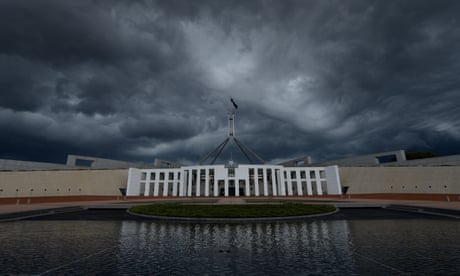- by foxnews
- 10 Mar 2025
Seven tired old tropes politicians wheel out in place of a vision for Australia’s future | Satyajit Das
Seven tired old tropes politicians wheel out in place of a vision for Australia’s future | Satyajit Das
- by theguardian
- 26 Apr 2022
- in news

Australian voters who chose their preferred candidate before the election was called have saved time. The campaign's policy vacuum has hardly informed voting choices, with both major parties eschewing what the former US president George Bush Sr termed the "vision thing".
Whether or not politicians, irrespective of ideological colour, have the stomach for them, important and urgent economic challenges lie ahead.
Household living standards are threatened by rising costs, low wage growth, poor quality of jobs, employment insecurity, higher mortgage repayments and housing unaffordability.
Downgrades in 2022 global growth from 4.4% to 3.6% and China's slowdown, along with its reduced emphasis on infrastructure spending, diversification of commodity suppliers and the antagonistic Sino-Australian relationship, pose risks to an uneven post-pandemic recovery. With China being the world's factory, its Covid-19 policy may continue to disrupt supply for some time.
Longer term, the pandemic and geopolitical realignments may reshape the global economic order. Australia, an open economy dependent on trade and the free flow of capital, is exposed.
Rising costs of providing retirement incomes, aged care, and health and disability services will need to be met. With climate change accelerating, even modest restrictions on carbon emissions will impact Australia's fossil fuel exports. Adaptation to regular extreme weather events and resource scarcity will be expensive. Increases in public and private debt have reduced flexibility to deal with these issues.
Major changes in the economic structure are needed. This requires cogent policies for managing volatile commodity incomes, demographics, the labour market, workforce and skills planning, productivity, and regulatory and tax frameworks. Welfare systems need to be redesigned to ensure they assist the disadvantaged.
Yet instead of addressing these issues, the 2022 election campaign has deployed familiar tropes.
Both major parties have thrown fistfuls of dollars aimed at effectively buying votes. The cost-benefit analysis of many initiatives is dubious. While individually small, a few millions here and there soon add up to serious money.
Both sides favour impressive announcements which they cannot or will not implement. During the pandemic and natural disasters, many government programs were difficult to access. Intentional complexity and a lack of resources allocated to processing applications means assistance frequently goes unused. Improvements in the federal budget result from money allocated for programs but not spent. The proclamation of a headline-grabbing scheme substitutes for taking the necessary action.
Population growth to underpin economic activity and high property prices is popular with the two-thirds of the population who own real estate. This ignores resource constraints and limits on available land, which is protected from the effects of climate change.
Initiatives, especially on defence, run into tens of billions. Voters are meant to be impressed by the sums, incomprehensible to most, even if the project's merits are unclear.
Credit is claimed for positives, irrespective of the claimant's contribution. Australia's recovery is driven by factors outside policymakers' influence - for example, Chinese iron ore and coal demand, high commodity prices and supply disruptions elsewhere. The only direct input has been substantial government spending of other people's money. Simultaneously, external factors such as the Ukraine conflict - outside Australian control - are blamed for negatives that include rising fuel, energy, food and housing costs.
Numbers are manipulated to present favourable outcomes. Budget forecasts have repeatedly underestimated revenues, overestimated outgoings and understated commodity prices to make the actual outcome better and demonstrate competence.
For hard issues, inquiries or royal commissions are proposed even though the problems and solutions are already known.
If all else fails there is the the belief that something, probably new technology, will turn up, because it always has. Donald Horne's phrase "the lucky country" is resurrected, ignoring its irony and criticism of a nation lacking imagination and mired in philistinism, provincialism, complacency and its past.
While grist for comedians, this policy drift has consequences. Problems become larger and solutions more costly, or they have reduced effectiveness. Future generations are left to deal with the mess.
The process encourages societal "cakeism": keeping your confectionery and eating it. It promotes unrealistic expectations that there are no costs to choices and everyone can have everything when they desire it merely because they demand it. A "looting" mentality sets in. Voters auction their allegiances to the highest bidder under a "what's-in-it-for-me?" ethos, ignoring the wider costs.
Elections should be serious undertakings, when alternative plans and visions on important issues are presented and debated. The 2022 election campaign has, to date, fallen well short of this standard. This exacerbates a lack of voter engagement, a fragmented political process and, ultimately, a loss of trust in democracy itself.
- by foxnews
- descember 09, 2016
Ancient structure used for cult 'rituals' discovered by archaeologists
A Neolithic Timber Circle was discovered by archeologists in Denmark resembling the historical landmark Stonehenge in the U.K. It is open to be viewed by the public.
read more


